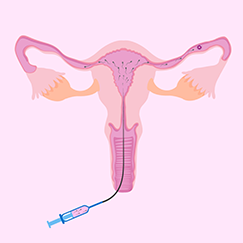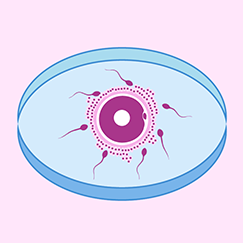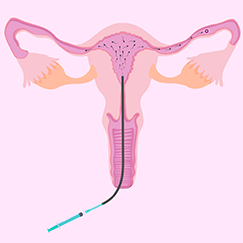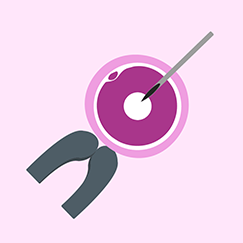Treatments
Null tempus sollicitudin dui, ut vehicula lacus porta vel duis
urna ligula luctus at feugiat a lacinia ut sem.
In Vitro Fertilization
-
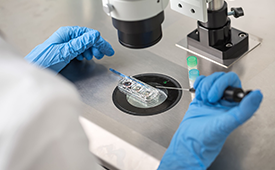 In Vitro Fertilization
In Vitro Fertilization
-
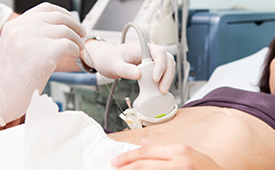 Non-Invasive Treatment
Non-Invasive Treatment
-
 Complimentary Health
Complimentary Health
-
 Treatments for Men
Treatments for Men
-
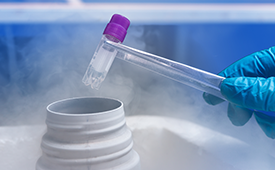 Fertility Preservation
Fertility Preservation
-
 Donation & Surrogacy
Donation & Surrogacy
-
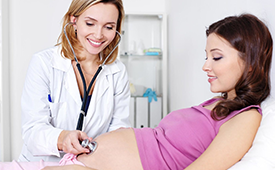 What to Expect
What to Expect
-
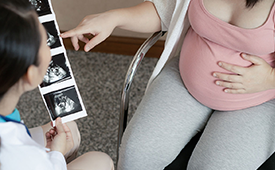 Treatment Checklists
Treatment Checklists
-
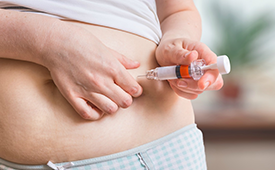 Injection Guide Links
Injection Guide Links
-
 Support Groups
Support Groups
In vitro fertilization (IVF) is the process of retrieving eggs and sperm and combining them in a lab for fertilization. One or more healthy embryos are selected to implant in the woman’s uterus and then the woman is monitored to to ensure the embryo implants and a successful pregnancy has been achieved.
Step 1. Ovarian Stimulation
Controlled ovarian hyperstimulation (COH) is the first step where the ovaries are stimulated to produce multiple mature eggs that can be analyzed to select the healthiest viable fertilized eggs for embryo transfer. In order to stimulate multiple mature eggs in one cycle, medications and hormones are prescribed.
Step 2. Ovarian Stimulation Monitoring
Women prescribed hormone therapy prior to egg retrieval are carefully monitored by vaginal ultrasound and hormone blood tests. Ultrasounds are scheduled at the beginning of ovarian stimulation and then every few days once follicle growth is established. Monitoring continues until at least three follicles reach maturity and egg retrieval is scheduled.
Step 3. Egg Retrieval
A fine needle is attached to the side of the ultrasound probe used for vaginal scans and the probe is gently placed in the vagina and advanced into the ovary. The needle penetrates each follicle in both ovaries and drains the fluid from inside each follicle. The follicular fluid is immediately sent to laboratory and examined by the embryologist for the presence of an egg.
Our state-of-the-art operating suite is designed to be directly adjacent to our laboratory for your convenience and comfort.
Step 4. Hormone therapy to prepare the uterus
Hormone therapy is prescribed after egg retrieval in order to support implantation of the embryo after fertilization.

- Estrogen: to develop and support the endometrium (uterine lining).
- Progesterone: to support the endometrium in pregnancy.
- Medrol: to help implantation.
- Doxycycline: to prevent infection and to support a favourable uterine environment for implantation.
Step 5. Fertilization
After fertilization, an embryologist examines the eggs under microscope to determine how many eggs have been fertilized. Fertilized eggs are then cultured and stored for transplantation.
The embryologist’s skill and experience, as well as the conditions in the laboratory, are the major factors that determine the success rate of a fertility centre.
Step 6. Embryo transfer
Embryo transfer takes place two to five days after egg retrieval and fertilization. The decision about when to transfer the embryos is made on an individual basis and depends on the number and quality of embryos.
The optimal number of embryos to transfer is determined by our specialists to minimize the risk of multiples pregnancy and maximize the chance of pregnancy.
One or more embryos are then transplanted into the womb and 2 weeks after the transfer, a pregnancy test will confirm the embryo has implanted successfully. An ultrasound scan is usually scheduled two weeks after a positive pregnancy test to confirm the ongoing pregnancy.
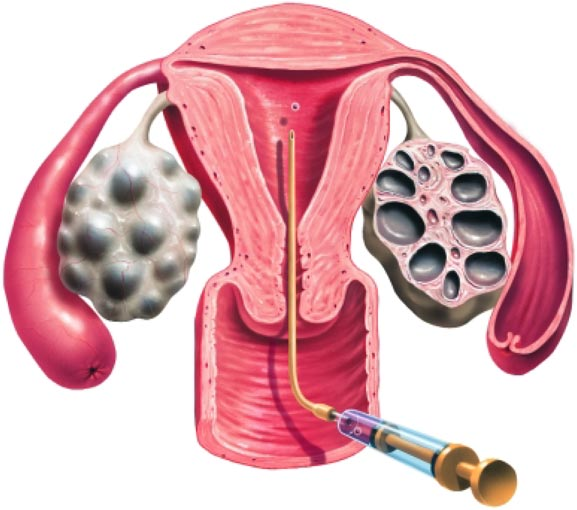
IVF (IVF Treatment) is used to treat blocked, damaged, or absent fallopian tubes, as well as endometriosis, unexplained infertility or advanced maternal age. It is also recommended to treat many male infertility factors such as azoospermia, sperm with abnormal structure or function, blocked or absent vas deferens or genetic causes of male infertility.
Risks of in vitro fertilization
Although IVF is a safe treatment, there are potential risks.
- Medications
- Egg retrieval
- Embryo transfer
- Embryo implantation & development
- What are the factors impacting the IVF success rate?
- What makes people visit us?
Some women may experience side affects from IVF-related medications (headaches, bloating, mood swings, abdominal pain or ovarian hyperstimulation)
Ovarian hyperstimulation syndrome (OHSS) occurs when the ovaries over respond to medication stimulation and produce an excessive number of eggs. This only occurs in less than 1% of IVF treatments.
There is a very low risk of complication but egg retrieval can cause pelvic infection or significant bleeding. Additionally, there is a very minor risk of a negative reaction to anaesthesia and damage to the bowel and bladder or abdominal organs.
Transferring multiple embryos carries the risk of multiples pregnancy. Multiples birth, whether conceived naturally or through IVF Clinic Canada, pose health risks to both the mother and unborn children. Maternal complications include increased risk of gestational diabetes (diabetes during pregnancy), hypertension (high blood pressure) and haemorrhage.
Fetal complications include increased risk for premature birth or miscarriage, cerebral palsy and low birth weight. In the event of a triplet pregnancy a reduction to singleton or twins is strongly recommended.
At OriginElle, our main aim is to cure the patient with the best possible care and make them provide the best fertility treatment to increase their chances of conceiving. We ensure better fertility treatment through IVF and many other procedures. But there are some factors on which the success rate of IVF treatment is dependent. These factors include:
- Age: This is one of the important factors that can increase or decrease your chances of IVF success rate. If the female is young then there are chances of having a good amount of healthy eggs. With age, the ovarian function decreases and causes the production of a smaller number of eggs.
- Previous pregnancy is also an important factor that impacts the IVF success chances.
- Lifestyle habits such as alcohol drinking and smoking also decrease the chance of pregnancy through IVF.
Right from ensuring better care and effective treatment, we ensure complete satisfaction to the patients. Some of the reasons that make people visit this clinic are:
- There is a team of fertility specialists who knows how to evaluate and treat the patients through different treatment processes. They are highly experienced and well qualified and work in coordination with other doctors to ensure high results. Not just this, they also give proper to the patients during consultation.
- At OriginElle, only the latest and state of the art treatment technology is used by the doctors. This helps in providing precise results and ensuring a high success rate in the fertility treatments.
- In this clinic, you will find friendly nursing staffs who work round the clock to ensure the best possible care to each and every patient. Along with this, patients are charged with affordable treatment fees.
Some women may experience side affects from IVF-related medications (headaches, bloating, mood swings, abdominal pain or ovarian hyperstimulation)
Ovarian hyperstimulation syndrome (OHSS) occurs when the ovaries over respond to medication stimulation and produce an excessive number of eggs. This only occurs in less than 1% of IVF treatments.
There is a very low risk of complication but egg retrieval can cause pelvic infection or significant bleeding. Additionally, there is a very minor risk of a negative reaction to anaesthesia and damage to the bowel and bladder or abdominal organs.
Transferring multiple embryos carries the risk of multiples pregnancy. Multiples birth, whether conceived naturally or through IVF Clinic Canada, pose health risks to both the mother and unborn children. Maternal complications include increased risk of gestational diabetes (diabetes during pregnancy), hypertension (high blood pressure) and haemorrhage.
Fetal complications include increased risk for premature birth or miscarriage, cerebral palsy and low birth weight. In the event of a triplet pregnancy a reduction to singleton or twins is strongly recommended.
At OriginElle, our main aim is to cure the patient with the best possible care and make them provide the best fertility treatment to increase their chances of conceiving. We ensure better fertility treatment through IVF and many other procedures. But there are some factors on which the success rate of IVF treatment is dependent. These factors include:
- Age: This is one of the important factors that can increase or decrease your chances of IVF success rate. If the female is young then there are chances of having a good amount of healthy eggs. With age, the ovarian function decreases and causes the production of a smaller number of eggs.
- Previous pregnancy is also an important factor that impacts the IVF success chances.
- Lifestyle habits such as alcohol drinking and smoking also decrease the chance of pregnancy through IVF.
Right from ensuring better care and effective treatment, we ensure complete satisfaction to the patients. Some of the reasons that make people visit this clinic are:
- There is a team of fertility specialists who knows how to evaluate and treat the patients through different treatment processes. They are highly experienced and well qualified and work in coordination with other doctors to ensure high results. Not just this, they also give proper to the patients during consultation.
- At OriginElle, only the latest and state of the art treatment technology is used by the doctors. This helps in providing precise results and ensuring a high success rate in the fertility treatments.
- In this clinic, you will find friendly nursing staffs who work round the clock to ensure the best possible care to each and every patient. Along with this, patients are charged with affordable treatment fees.
IUI is performed by collecting a sperm sample from the man, then separating and concentrating the motile sperm. The sperm are then injected into the woman’s uterus using a fine plastic catheter, thereby bringing the sperm closer to the ovulated egg in the woman’s fallopian tube and increasing the chance of pregnancy.
IUI is suitable for couples where the woman has at least one open fallopian tube and the man has enough motile sperm to fertilize the egg. Intrauterine insemination is recommended for a total of three cycles, after which, if no pregnancy is achieved, IVF or modified natural cycle IVF would be considered.
Ovulation induction the recommended procedure for women who are not ovulating/menstruating normally. Induction stimulates the monthly production off eggs from the woman’s ovaries with medications such as Clomiphene and Letrozole. If these medications are not effective, small-dose injections of fertility hormones called Gonadotropins may be necessary.

Clinical follow-up
All our patients are monitored regularly and frequently, typically 2 to 4 visits during a treatment cycle. Among our many techniques, we use a vaginal ultrasound sensitive enough to observe the fluid filled structures containing the eggs called follicles inside the ovary itself.
Example of Medicines used by our team.
- Clomiphene Citrate (Serophene, Clomid) or Letrozole (Femara).
- Injections, such as Gonadotropins (Follicle-Stimulating Hormone – FSH, and Luteinizing Hormone – LH) like Gonal F, Puregon, Repronex, Bravelle and Menopur or human Chorionic Gonadotropins like Profasi, Pregnyl and Ovidrel, or GnRH agonists like Lupron and Buserelin.
Ovarian stimulation is used for women who ovulate normally but whose infertility cannot be explained, or whose partner has mild male-factor infertility. Ovarian stimulation aims to develop two to four follicles containing mature eggs during the woman’s monthly cycle, rather than the typical one.This is rather easily achieved by injections of fertility hormones called Gonadotropins. The treatment is typically combined with intrauterine insemination (IUI) to assist the sperm in reaching the egg.
Clinical follow-up
Using our ultrasound, once we determine the leading follicle(s) reaches 18 mm in diameter, the egg is considered mature and ready for ovulation and fertilization.
Complementary Health Services
Our complementary health services draw on all forms of health care to treat the patient, from conventional medications and treatments, to alternative therapies such as acupuncture, yoga, reiki, nutrition and weight loss, meditation, aromatherapy, Ayurveda, naturopathy and chiropractic movements.

Acupuncture is based on the concept of qi, an energy that flows along certain bodily paths. Acupuncturists work to balance qi by stimulating specific points along those paths by the insertion of ultra-thin needles. These points are key to the channels—called meridians—that are pathways of qi, both internal and external to the body.
Acupuncturists believe that these points regulate bodily functions, and to a great extent may relieve the emotional attack on a person by a diagnosis of infertility and the extreme stress of subsequent fertility treatments. Acupuncturists also believe that acupuncture may address some fundamental causes of infertility itself.
 Infertility and its treatments can affect your mind, body and finances; each causing tremendous stress. Yoga is a holistic approach to infertility that reduces stress and addresses the mental and emotional side of infertility and fertility treatments. Yoga as a stress reliever for infertility and subsequent fertility treatments has grown and has been accepted as a beneficial activity by many reproductive professionals.
Infertility and its treatments can affect your mind, body and finances; each causing tremendous stress. Yoga is a holistic approach to infertility that reduces stress and addresses the mental and emotional side of infertility and fertility treatments. Yoga as a stress reliever for infertility and subsequent fertility treatments has grown and has been accepted as a beneficial activity by many reproductive professionals.
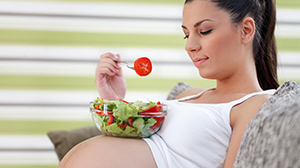
Obesity affects fertility in both men and women. In men, obesity can reduce the number and quality of a man’s sperm because obesity affects testosterone levels; and in women, obesity can lower IVF success rates, higher rates of miscarriage, and higher rates of complications for the mother and baby.
In addition, PCOS , a leading cause of infertility, is more common in obese women. Obesity can also influence estrogen production in both men and women, reducing sperm production in men and making it more difficult for an embryo to implant in a woman’s uterus.

Acupuncture is generally safe, but it does carry risk of miscarriage when incorrect acupuncture points are stimulated during pregnancy. Acupuncturists should not insert needles into the six contraindicated abdominal-pelvis points after insemination or embryo transfer.
Infections after acupuncture can occur in rare cases, especially if the needles are not sterile. Licensed providers discard needles after one use. Thus, it is critical for infertile couples who use acupuncture in their fertility therapy to select a highly trained, licensed and certified provider, in coordination with their fertility doctor.
Yoga, reiki, and weight loss are generally risk-free. Caution should be taken with some alternative therapies like herbal remedies, dietary supplements, or aromatherapies because they may interact with fertility medications used during the assisted reproduction cycles. Consult with a reproductive specialist for advice on any substance that enters the body, either via ingestion, injection or inhalation.
Several published scientific studies call into question the effectiveness—beyond what’s called the Placebo Effect—of alternative medicine in treating any known disease. However, some reproductive specialists believe that if it works to achieve pregnancy, whether through the placebo effect or actual cause/effect, then alternative medicine is useful as a tool of assisted reproductive technology.
To diagnose and determine the extent of male factor infertility, a semen sample must be collected either through masturbation or surgical removal.
Medical therapies
In approximately 50% of infertility cases, male factor infertility is the primary cause.
For example, hypogonadism (low sperm quantity and quality) and infection/inflammation in the male reproductive tract can be common causes of subnormal semen and impaired egg fertilization. Both conditions are usually treatable.
Surgical sperm retrieval for azoospermia
Azoospermia is a condition where there are no sperm in the man’s semen. Azoospermia is caused by poor testicular function or obstruction of the male reproductive tract. It is the most challenging male infertility condition to manage.
The following procedures may be used to treat azoospermia:
- Microepdidymal Sperm Aspiration (MESA): A procedure that gathers sperm from the duct that stores and transports sperm from the testes to the deferens tubes.
- Percutaneous Epdidymal Sperm Aspiration (PESA): The insertion of a needle through the scrotum into the epididymis, where sperm are stored prior to reaching the deferens tubes.
- Testicular Excisional Sperm Extraction (TESE): Removal of a small amount of testicular tissue from which sperm may be extracted. This is not normally performed for blockages, but can be used in cases where azoospermia is caused by testicular failure, an uncommon condition.
- Testicular Excisional Sperm Aspiration (TESA): A needle is used to gather sperm directly from the testes. This is similar to TESE, except tissue is not removed.

Viable sperm can be stored (frozen) for use at any time in future fertility treatments.
Fertility preservation for cancer survivors
Men who have had cancer and are in remission after chemotherapy, radiation therapy or aggressive surgery will often find their fertility severely impaired. It is therefore critical that fertility preservation procedures begin before cancer treaments.
If treatments have already occured, advanced semen analysis can be used to evaluate sperm quality and our advanced microsurgical techniques such as micro-dissection testicular sperm extraction (micro-TESE) can allow men to use their own sperm for the couple to achieve IVF pregnancy.
Assisted reproduction options for patients with medical conditions
Men with spinal cord injury, diabetes, pelvic and bladder injury or other neurological conditions may have severe impairment to their sexual function, particularly in the ejaculation of semen.
Originelle can provide each of the procedures above to retrieve viable sperm for IVF treatments.
Fertility preservation is the process of freezing eggs, sperm or embryos and storing them for future use (cryopreservation). When they are needed, the eggs, sperm or embryos may be thawed and used in a fertility treatment procedure called in vitro fertilization (IVF). Dr. Tan and his colleagues at OriginElle are world leaders in fertility preservation.
Egg freezing
To collect a woman’s eggs (oocytes) for cryopreservation, medication is prescribed to stimulate her ovaries to produce multiple mature eggs. The eggs are removed and preserved through a freezing process and the eggs are then stored until needed by the woman or couple for IVF.
Embryo freezing
Prior to the freezing process, the woman’s eggs are combined and fertilized with her partner’s sperm in the fertility clinic lab. The resulting embryos are cultured for a few days to allow them to grow (the same process used in IVF), then frozen and stored for future use when the couple desires to use them for the final stage of IVF (transferring the embryo(s) to the woman’s uterus).
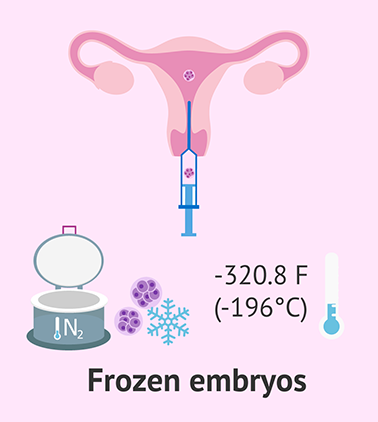
Sperm freezing
The man can provide a sperm sample for freezing through natural means. If no sperm are present in the sample or if the man cannot ejaculate, a surgical sperm extraction technique may be used.
The most pressing need for fertility preservation is generally right before cancer treatments begin. Both chemotherapy and radiation have the potential to damage a person’s fertility or cause infertility if the treatment affects the reproductive cells or tissue. Women with other medical conditions where treatment can reduce fertility should also consider fertility preservation.
Other reasons to preserve fertility can be for lifestyle, social or career reasons.
Freezing eggs, sperm and embryos has become a perfected process and is very safe. The risks of complicated pregnancies or birth or genetic defects with cryopreserved eggs, sperm, or embryos is the same as in conventional IVF technologies.
A woman may need to pursue an egg donor if her ovaries cannot produce eggs or if her eggs are not healthy. The retrieval, fertilization and implantation process are identical as if her own eggs were used.
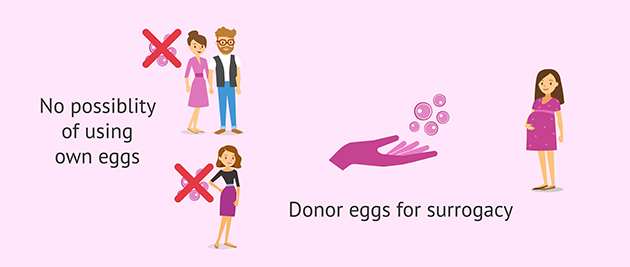
When a man’s testes cannot produce sperm or when the sperm that is produced is of very poor quality, a couple may consider the use of donor sperm. Sperm donors are screened according to Health Canada regulations.
Surrogacy is recommended for women who have functioning ovaries but lack a uterus or have uterine problems that make it difficult to maintain a pregnancy. A surrogate may also be recommended if the woman has one or more medical conditions that would make carrying a pregnancy unsafe.
At the OriginElle, third party reproduction treatments have been refined to minimize the number of patient visits and decrease the stress and inconvenience of treatment.
Today, success rates of third party treatment compare favorably with those of regular IVF treatments.
Before your first visit, please download and complete the Self-Assessment Form, and bring this form with you to your first visit. Your medical records should also be sent to us before your appointment, especially detailed information about any previous IVF treatments you may have had. For more information, please download and read the New Patient Information & Checklist.
Since the first visit is very comprehensive, you should allow up to two hours for the appointment. Please be aware that it is not possible for us to start IVF treatment unless your and your partner’s test results are fully completed and consent forms are signed.
On your first visit, our specialists will interview you and your partner and take your medical, surgical and other relevant history to begin the process of determining the cause of infertility. We will also discuss any previous treatments, the results of tests you may have completed and options for further treatment.
The initial assessment may include tests to evaluate and formulate the best treatment for you. Future tests may also be necessary, depending on the initial workup. If you have had any tests performed within the past year, please bring the results with you to the consultation.
Tests for the female partner
Your doctor may perform a number of tests (blood, physical exam, ultrasound, etc.) to help determine the cause of infertility.
Tests for the male partner
The doctor will do a sperm analysis to evaluate your sperm volume, acidity (pH) of the semen, number of sperm, percentage of motile sperm, morphology (shape) of the sperm, and the number of round cells in the semen. In case of an abnormal first analysis, your doctor will repeat the test. Male factor infertility is only diagnosed after repeated abnormal semen analysis. DNA fragmentation may also be performed.
Other tests may include blood tests for hormones such as FSH, LH, estradiol, and testosterone (if indicated), and blood tests for transmissible diseases such as HIV, Hepatitis B, and Hepatitis C. Depending on your medical history, additional tests may be necessary.
In most cases, your doctor will see you for a second review consultation to discuss the results of your tests before you start treatment. It is also useful to have a review consultation after completing a treatment cycle if a pregnancy does not occur. Experience gained from the previous treatment will be incorporated into planning the next round of treatment.
To help prepare you for your treatment, we offer the following informational handouts that address how to prepare for certain treatments, as well as post-treatment care and questions. If you have any questions regarding your treatment beyond the information below, please contact us.
Below are helpful step-by-step video instructions on how to use your fertility treatment medications. If you have any questions, please call us at (514) 369-0688 or contact us online.
How to Self-Inject Bravelle®
Instruction video on how to self-administer the fertility drug Bavelle® for fertility patients
How to Self-Inject Gonal-f® Multi-Dose 450 IU
Instruction video on how to self-inject the fertility drug Gonal-f® Multi-Dose 450 IU for fertility patients.
How to Self-Inject Gonal-f® RFF 75 IU Vial
Instruction video on how to self-inject the fertility drug Gonal-f® RFF 75 IU Vial for fertility patients.
How to Self-Inject Luveris®
Instruction video on how to self-inject the fertility drug Luveris® for fertility patients.
How to Self-Inject Menopur®
Instruction video on how to self-inject the fertility drug Menopur® for fertility patients.
How To Inject Progesterone in Oil®
Instruction video on how to self-inject the fertility medication Progesterone in Oil® for fertility patients.
Following an initial interview with your doctor, one of our trained nurses will be assigned to you. She will be available throughout your fertility treatment to advise and support you. Once the treatment options have been determined, your nurse will discuss the timing of the treatment, explain the drug regimen, review the plan of treatment on a day-to-day basis and answer any other questions you might have.
Your nurse will arrange a suitable date for the start of your treatment and will make every effort to adjust the treatment schedule to your work life.
Owing to the sensitive and emotional aspects of the infertility workup, we encourage counselling before and during treatment. Counselling services are available on-site from our independent experienced counsellors. We advise and encourage all patients to utilize these services.
What is fertility counselling?
Fertility counselling is professional help from medical caregivers and mental health professionals who have experience and training in counselling couples experiencing infertility.
Infertility and fertility treatments can affect all aspects of a couple’s lives and can cause a number of emotional issues that impact relationships, perspective on life, and feelings of self-image and self-worth. Couples can benefit from the support of family, friends, and medical and health professionals.
When to see a fertility counsellor
Couples or individuals who become so preoccupied with their infertility that it affects their personal or work life, then a fertility counsellor can support you in addressing feelings of depression or high anxiety – whether about treatment, infertility or other issues surrounding your treatment.
You should see a fertility counsellor or psychological professional if you are experiencing any of the following:
- Marital problems
- Persistent feelings of sadness or guilt
- Increased use of alcohol or drugs
- Suicidal thoughts
- Social isolation
- Changes in sleep patterns
- Changes in appetite
- Extreme weight gain or loss
Additionally, if a couple is considering fertility treatments options that include sperm, egg or embryo donation or gestational carriers, it will be especially critical to seek fertility counselling to negotiate the emotional issues attached to those treatments, as well as discuss your options to find a choice that best fits your family’s needs and goals.
Finding ways to lower stress during fertility treatment may also help the success of the treatment.
OriginElle offers support groups for:
- Couples
- Single Moms
- Couples/singles using egg donation
These support groups are intended for patients who are in treatment at the OriginElle Fertility Clinic and facing the challenges of infertility.
Bring your questions and concerns and we will provide the tea and biscuits.
Please sign up at the reception during your visit, or by calling us at (514) 369-0688.


